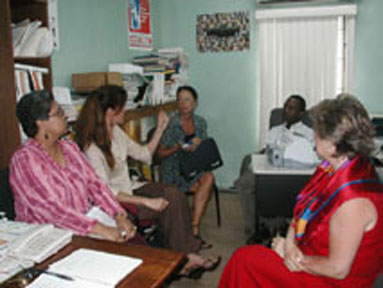Following a comprehensive CIDA review of the Guyana health sector in 2000, the Canadian Society of International Health (CSIH) was recruited to design and implement the Public Health Strengthening in Guyana Project (PHSGP), which addresses several areas in which Canadian organizations could work and play a significant role, including in the prevention and management of HIV/AIDS, sexually transmitted diseases and tuberculosis, and in the design and maintenance of a Guyanese health information system.
In 2001, Guyana was the poorest English-speaking country in the Caribbean with a population of just over 740 000. The health system had been adversely affected by continuing political conflicts, violence, poverty, inequity and the migration of qualified professionals. Lack of investment and ineffective human resource policies resulted in poor distribution and inequalities in health care provision: 12.5% of Guyana’s population did not have access to healthcare. Low population density and the geographical challenges in some regions also affected coverage and infrastructure development.
In Guyana, women were more vulnerable than men to HIV infection because they lacked the negotiating power to determine where, when, and whether sex occurs. The rate of the increase in the number of AIDS cases was also faster in females than in males. Within Guyana’s ethnically diverse population, the way in which men were expected to behave according to social and cultural norms in turn heightened their vulnerability to other diseases. Men were also less likely than women to seek health care and were more likely to engage in risk‐taking behaviours. Thus, there was need for improvement in how the country’s health infrastructure approached its overburden of HIV/AIDS, sexually transmitted diseases and tuberculosis.
To improve and maintain the health of Guyana’s population, by supporting an integrated approach to disease prevention, diagnosis, management, and care at the national and district/community levels
CSIH worked with international organizations and local experts to strengthen and support human resources development, build and extend local capacity, (using a training of trainers (TOT) methodology), develop guidelines and manuals, procure medical/laboratory equipment and laboratory supplies, refurbish laboratories, clinics and educational facilities, and undertake Guyana‐specific research to inform local decision‐making, guidelines, and policy development in Region 4 (Demerara‐Mahaica), Region 6 (East Berbice Corentyne) and Region 10 (Upper Demerara‐Berbice); additional sites were later included in Region 3 (Essequibo Islands).
CSIH Project experts trained more than 105 local trainers through ongoing skills‐building and mentoring; these local trainers provided subsequent training to more than 3000 health providers, physicians, nurses, medex, DOTS workers, community health workers, union reps, and volunteers. This in turn developed local capacity to carry on and implement the project with increasingly less Canadian technical assistance. In a 2004 Report, Dr. S. Singh stated, “These sessions were very informative, with presenters focusing on the latest developments in the area of HIV/AIDS and treatment. Emphasis was placed on the management of HIV/AIDS with limited resources as in the Caribbean.” The project received recognition by The PHSGP when the Canadian Manufacturers and Exporters (CME) and CIDA honoured the Project with the Award for the Improvement of Social Infrastructure/Condition at the 14th annual Canadian Awards for International Cooperation
A longer design phase or planning period at implementation start‐up that includes RBM workshops with local partners would be beneficial. In addition, making quarterly budgetary estimates for complex projects, especially for items to be procured, can be problematic as it often takes months between the start of the procurement process and the actual receipt and payment of the item procured. Furthermore, incorporating in‐kind technical assistance from Canadians of Guyanese origin goes a long way in strengthening local partnerships and gaining additional local buy‐in of project recommendations.

